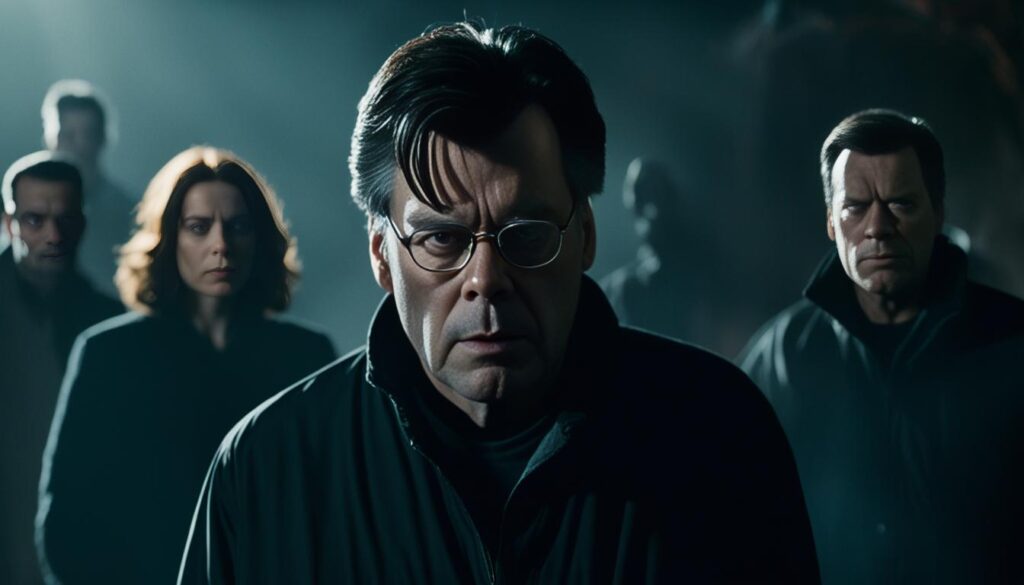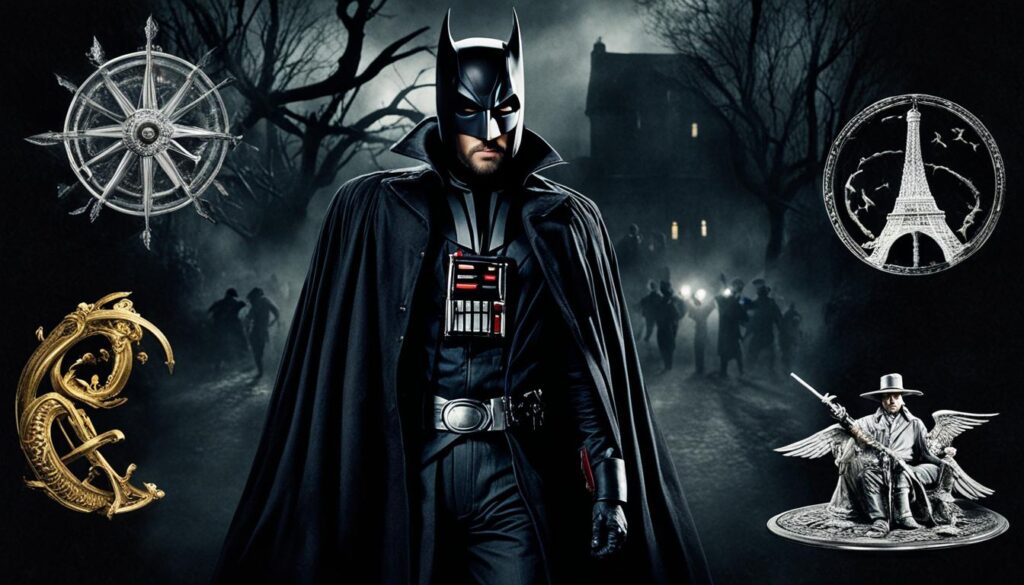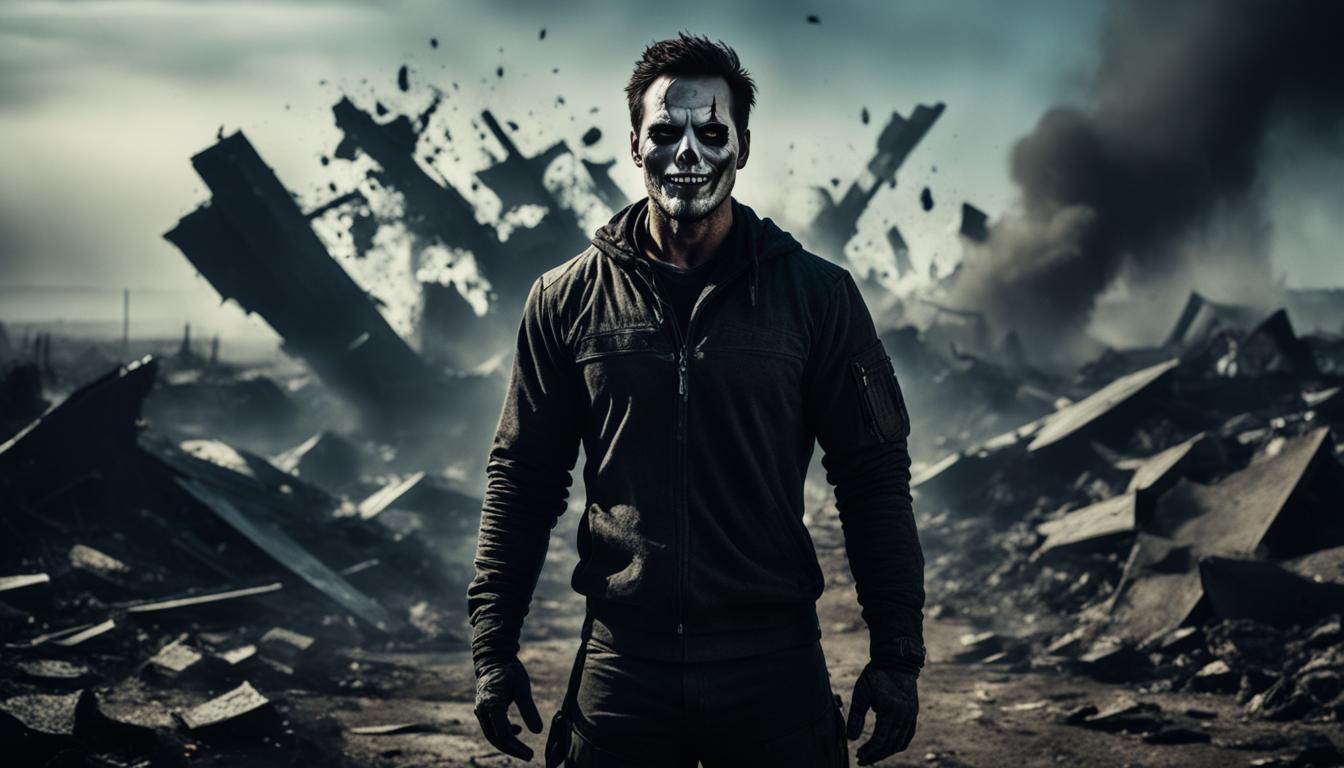In this article, we will take a closer look at “The Dark Man,” one of Stephen King’s most malevolent creations. King is widely regarded as a master of the horror genre, and his works have left an indelible mark on popular culture. Within his vast oeuvre, “The Dark Man” stands out as a quintessential evil character that has captured the imaginations of readers worldwide.
The creepy and pervasive presence of the Dark Man in King’s works is both intriguing and unsettling, leaving readers fascinated and fearful at the same time. Throughout this article, we’ll explore his origins, symbols, cultural significance, and influence in popular culture. So, if you’re ready to delve into the eerie world of Stephen King and the sinister “The Dark Man,” let’s get started.
Stephen King: Master of Horror
Stephen King is one of the greatest writers of our time and a master of the horror genre. His ability to captivate readers with his frightening and suspenseful stories has earned him a place in literary history. King’s influence extends beyond the horror genre, with his works being adapted to popular films and TV series.
Influential Works
King has written over sixty novels in a writing career that spans more than 40 years. His most iconic works are “The Shining,” “Carrie,” “IT,” “Pet Sematary,” and “The Stand.” Each of these novels scared readers beyond their wildest dreams, solidifying King’s position as a master of horror.
Writing Style
King’s writing style is distinctive, characterized by his casual, conversational tone that draws readers into the story. Additionally, his use of vivid and haunting descriptions creates an unsettling atmosphere that stays with readers long after they finish reading.
Impact on Literary World
King’s works have left a lasting impact on the literary world. He has inspired many younger writers and redefined the horror genre. His influence can be seen in modern horror writing, with many authors citing him as the reason they became writers.
| Accolades | Achievements |
|---|---|
| Won Bram Stoker Award Seven Times | Inducted into the Maine Writers and Publishers Alliance Hall of Fame |
| Won O. Henry Prize in 1996 | Received National Medal of Arts from the United States |
| Winner of Hugo Award for Best Novel | Received Arthur C. Clarke Award for Best Science Fiction Novel |
Stephen King’s achievements and accolades are a testament to his immense talent and unrivaled position as the king of horror. His contributions to the literary world have earned him a place in the canon of American literature.
Unveiling “The Dark Man”
Stephen King’s evil character, “The Dark Man,” is a malevolent figure who embodies evil in his vast literary universe. In his stories, the Dark Man is often portrayed as a supernatural being with immense power, capable of manipulating and tormenting those around him.
The significance of the Dark Man lies in his ominous presence throughout King’s works, providing a consistent thread that ties together the author’s vast literary universe. The Dark Man first appeared in King’s poem “Childe Roland to the Dark Tower Came” and went on to feature in a number of King’s stories, including “The Stand” and “The Dark Tower” series.
The chilling effect of the Dark Man is indisputable. Like a haunting specter, his presence lingers long after the story has been told. This is due, in part, to King’s masterful storytelling abilities. His vivid descriptions of the evil character, combined with his expert use of suspense, ensure that the reader is left in a state of unease long after putting down the book.
The origins of the Dark Man are shrouded in mystery, but his influence is undeniable. In subsequent sections, we will explore the impact of this iconic evil character on King’s works and popular culture as a whole.
The Dark Man’s Impact on King’s Works
“The Dark Man” has had a profound impact on several of Stephen King’s iconic stories. This evil character’s influence can be seen in recurring themes and motifs that echo throughout King’s vast literary universe.
One of the most notable examples of the Dark Man’s impact on King’s works is in the “The Stand.” The character of Randall Flagg, who is seen as the embodiment of evil, is described as a tall man with the “face of an angel and eyes like a snake.” This description is reminiscent of the Dark Man’s physical appearance, with his “pebble-dense eyes” and towering stature.
The Dark Man is also present in “The Gunslinger” series, in which the character of Roland Deschain battles against the forces of evil personified by the character of Walter O’Dim, a.k.a. the “Man in Black.” This character is said to have powers and abilities that far exceed those of a mere mortal, much like the Dark Man himself.
Moreover, in “Desperation,” King presents a character that closely resembles the Dark Man, known as Tak, a malevolent force that possesses the inhabitants of a small town. The characterization of Tak closely mirrors that of the Dark Man, as both entities are known for their power and influence over those who fall under their spell.

As seen in these examples, the Dark Man’s influence can be seen throughout Stephen King’s works, taking on various forms and manifestations. From towering figures of evil to malevolent forces with the power to possess, the Dark Man has left an indelible mark on the horror genre, and on King’s works in particular.
Symbolism and Themes in “The Dark Man”
In Stephen King’s “The Dark Man,” symbolism and themes are weaved seamlessly into the narrative, creating a profound and thought-provoking reading experience. The Dark Man himself is a significant symbol, embodying the malevolent force that threatens the characters within King’s verse. He represents the universal themes of good vs. evil, the battle for power and control, and the primal fear of the unknown.
Furthermore, the psychological and existential implications of the Dark Man’s presence in the story are significant. His looming threat and oppressive influence on the characters represent the darker aspects of human nature – our innate desires, fears, and insecurities. Through the Dark Man, King explores the fragility of the human psyche and the struggle for self-preservation against overwhelming adversity.
The Symbolism of Colors
| Color | Description |
|---|---|
| Black | Represents the Dark Man and his malevolent influence |
| White | Symbolizes purity and the forces of good |
| Red | Represents blood, violence, and the threat of death |
| Green | Symbolizes growth, renewal, and the natural world |
Moreover, colors play an important role in the symbolism of “The Dark Man.” Each color represents unique themes and motifs throughout the story. For example, black symbolizes the Dark Man and his malevolent influence, while white represents purity and the forces of good. Red represents blood, violence, and the threat of death, while green symbolizes growth, renewal, and the natural world.
Overall, the symbolism and themes within “The Dark Man” elevate the story beyond its horror genre trappings, delving deep into the human psyche and exploring universal concepts that resonate with readers. Its enduring popularity attests to the significance and power of King’s narrative and the profound impact it has had on readers and writers alike.
Haunting Descriptions and Visions
Stephen King’s ability to create terrifying images is unparalleled, and “The Dark Man” is no exception. Indeed, the haunting descriptions associated with this malevolent figure are enough to send shivers down any reader’s spine.
The Dark Man is often depicted as a shadowy figure, looming ominously in the dark corners of King’s tales. His eyes are piercing and all-knowing, while his presence radiates malevolence and danger. One can almost smell the pungent stench of decay and death that seems to follow in his wake.
Such vivid, spine-chilling descriptions mean that The Dark Man has become an indelible part of Stephen King’s literary universe. He continues to haunt readers, both literally and figuratively, long after the last pages of a book have been turned.
Literary and Cultural References
Stephen King’s writing is full of literary and cultural references, adding depth and complexity to his works. “The Dark Man” is no exception, and in this section, we’ll explore some of the allusions present in King’s haunting verse.
Literary References
One of the most notable literary references in “The Dark Man” is to William Blake’s poem, “The Tyger.” The poem’s themes of creation, destruction, and duality are echoed in King’s character, as the Dark Man represents both chaos and order. Another significant reference is to Robert Browning’s poem, “Childe Roland to the Dark Tower Came,” which inspired King’s epic “The Dark Tower” series. The character of Roland, along with the Dark Tower itself, has ties to “The Dark Man.”
Cultural References
“The Dark Man” is filled with nods to popular culture, from music to film. In one scene, the Dark Man is seen dancing to the Rolling Stones’ “Sympathy for the Devil,” highlighting his devilish nature. Another reference is to the classic film “The Seventh Seal,” in which a knight plays a game of chess with Death. This imagery is echoed in “The Dark Man,” underscoring the idea of a battle between good and evil.

The Dark Man in Popular Culture
Beyond the literary realm, Stephen King’s “The Dark Man” has become a cultural icon, leaving an indelible mark on popular culture. The evil character has been adapted into various forms of media, including movies, TV shows, comics, and video games, solidifying his significance in the horror genre.
Movies and TV Shows
The Dark Man has been portrayed in several movies and TV shows, most notably in “The Stand” miniseries adaptation of Stephen King’s novel of the same name. In the series, the Dark Man is played by Jamey Sheridan, who brings the malevolent character to life with his intense and bone-chilling performance.
Comics and Graphic Novels
The Dark Man has also made appearances in comic books and graphic novels, showcasing the character’s ominous presence in the visual medium. In Marvel Comics, the Dark Man appears in “The Stand” adaptations, further solidifying his status as a pop culture icon.
Video Games
The Dark Man has also left his mark on the world of video games, with appearances in games like “The Dark Tower: The Sorcerer” and “The Dark Half.” These games allow players to immerse themselves in Stephen King’s world and come face to face with the Dark Man’s malevolent presence.
Readers’ Reactions to “The Dark Man”
Stephen King’s readers have been captivated by the malevolent character of “The Dark Man.” Fans of the author have shared their reactions to this evil being, and the impact it has had on their reading experience.
Many readers have noted that “The Dark Man” is one of King’s most chilling and terrifying creations. The character has been described as “haunting” and “unsettling,” leaving a lasting impression on the reader’s psyche. Some have even gone as far as to say that they were unable to sleep after encountering the Dark Man in King’s books.
There are also various fan theories surrounding the Dark Man’s presence in King’s universe. Some readers have speculated that the character represents an embodiment of evil, while others believe that he is a reflection of the darker aspects of humanity. The enigmatic nature of “The Dark Man” has left readers with plenty to think about, and the character continues to be a topic of discussion among King’s fans.
Overall, the character of “The Dark Man” has left an indelible mark on Stephen King’s readership. Its haunting presence has drawn readers in, inciting fear and fascination with its evil nature. Fans continue to be captivated by this malevolent character, and its impact on the literary world is undeniable.
Stephen King’s Legacy: The Dark Man’s Role
Stephen King’s contribution to the horror genre is immeasurable, and “The Dark Man” character has indelibly shaped his literary career. Yet, it’s not only King’s works that have been impacted by the Dark Man. This malevolent figure has also influenced subsequent horror writers and solidified his place in popular culture.
The influence of the Dark Man can be seen in the works of authors such as Clive Barker, Neil Gaiman, and Joe Hill, who have all paid homage to Stephen King’s iconic character. The frightening embodiment of evil has set a standard for horror writing that has yet to be surpassed, and its impact on the genre continues to reverberate.
Moreover, the Dark Man has become a cultural symbol. From merchandise to tattoos, the character has been immortalized in various forms of popular media. The Dark Man’s impact on popular culture speaks to the enduring power of Stephen King’s literary universe and the lasting impression of this malevolent character.
The Influence of “The Dark Man”
| Author | Works Influenced |
|---|---|
| Clive Barker | “The Great and Secret Show” |
| Neil Gaiman | “The Sandman” |
| Joe Hill | “NOS4A2” |
The lasting legacy of “The Dark Man” speaks to Stephen King’s masterful storytelling and his ability to weave characters that leave an unforgettable impact. King’s influence on the horror genre is unquestionable, and “The Dark Man” is just one example of how his creations have transcended beyond literature to become cultural icons.
Conclusion
“The Dark Man” is a testament to Stephen King’s unparalleled ability to create compelling and terrifying characters. We have explored the origins, impact, symbolism, and cultural significance of this malevolent figure. By delving into King’s haunting verse, we gain a deeper understanding of his mastery in the horror genre and the enduring legacy of “The Dark Man.”
As we have seen, the Dark Man has left an indelible mark on King’s literary works, embodying evil in his captivating stories and leaving a haunting effect on his readers. The significance of this character has also transcended beyond King’s novels, firmly solidifying his place in popular culture.
Through readers’ reactions and interpretations, we see the enduring impact of “The Dark Man” and how it has influenced subsequent horror writers. As such, “The Dark Man” remains a crucial element of Stephen King’s legacy and will continue to terrify and captivate readers for years to come.



